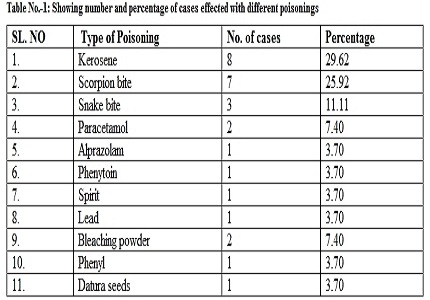Clinical profile of poisoning in children presenting to pediatric intensive care unit
Abstract
Introduction: Poisoning in pediatric age group became a challenging emergency in world that might be accidental, incidental or with snake bite or scorpion sting. In spite of many measures proposed by several organizations still the cases of poisoning are increasing.
Methods: In this study above 1 month to 18 years of age children were included. Cases of food poisoning, allergic drug reactions were included along with scorpion sting and snake bite. Various parameter analyzed were age, sex, time of ingestion, type of poison, signs and symptoms, time taken to reach hospital, treatment offered, and complications underwent by the patient.
Results: All the children who came with complaints of poisoning were admitted in the PICU. Total PICU admissions for 2 years were 693 out of which 27 cases were poisoning. Of total admissions 3.89% were poisoning cases. In total poisoning cases admitted female are 12 and males were 15. Accidentally ingested poisoning cases were 13, intentional ingested were 4 and poisoning due snake bite were 3, scorpion sting were 7. In accidental ingested poisoning 1 is by Datura seeds. Poisoning by ingestion was of total 17 cases and other (scorpion sting and snake bite) are 10. On comparing with age 1-5 years children were more effected i.e, 15.
Conclusion: It is retrospective study which showed accidental poisoning is commonly seen in under 5 age group children and incidental poisoning seen in above 10 age group children. In both groups parental counselling and safety measures improve the outcome. Early intervention of pediatric poisoning decreases morbidity and mortality in children.
Downloads
References
2. WHO-UNICEF. Children and poisoning: world report on child injury prevention. World Health Organization. 2008.
3. Buch NA, Ahmed K, Sethi AS. Poisoning in children. Indian Pediatr. 1991 May; 28(5):521-4. [PubMed]
4. Srivastava A, Peshin SS, Kaleekal T, Gupta SK. An epidemiological study of poisoning cases reported to the National Poisons Information Centre, All India Institute of Medical Sciences, New Delhi. Hum Exp Toxicol.2005 Jun;24(6):279-85. [PubMed]
5. Hyder AA, Wali S, Fishman S, Schenk E. The burden of unintentional injuries among the under-five population in South Asia. Acta Paediatr. 2008 Mar;97(3):267-75. doi: 10.1111/j.1651-2227.2008.00670.x. [PubMed]
6. Anderson CE, Loomis GA. Recognition and prevention of inhalant abuse. Am Fam Physician. 2003 Sep 1;68(5):869-74. [PubMed]
7. Pearn J, Nixon J, Ansford A, Corcoran A. Accidental poisoning in childhood: five year urban population study with 15 year analysis of fatality. Br Med J (Clin Res Ed). 1984 Jan 7;288(6410):44-6. [PubMed]
8. Basavaraj S, Pushpalatha K. Clinical profile and outcome of acute pediatric poisoning in urban tertiary care hospital. J Evid Based Med Healthc. 2015;2(5):459-63.
9. Sever M, Saz EU, Koşargelir M. An evaluation of the pediatric medico-legal admissions to a tertiary hospital emergency department. Ulus TravmaAcilCerrahiDerg. 2010 May;16(3):260-7. [PubMed]
10. Ahmed SM, Ahmed M, Nadeem A, Mahajan J, Choudhary A, Pal J. Emergency treatment of a snake bite: Pearls from literature. J Emerg Trauma Shock. 2008 Jul;1(2):97-105. doi: 10.4103/0974-2700.43190. [PubMed]
11. Sunil Kumar M.N. , Parvathy V.K. A Study of accidental ingestion of hydrocarbon in children in a medical college hospital in kerala: International journal of pediatric research 2016 May;5(3);295-301.

Copyright (c) 2017 Author (s). Published by Siddharth Health Research and Social Welfare Society

This work is licensed under a Creative Commons Attribution 4.0 International License.


 OAI - Open Archives Initiative
OAI - Open Archives Initiative


